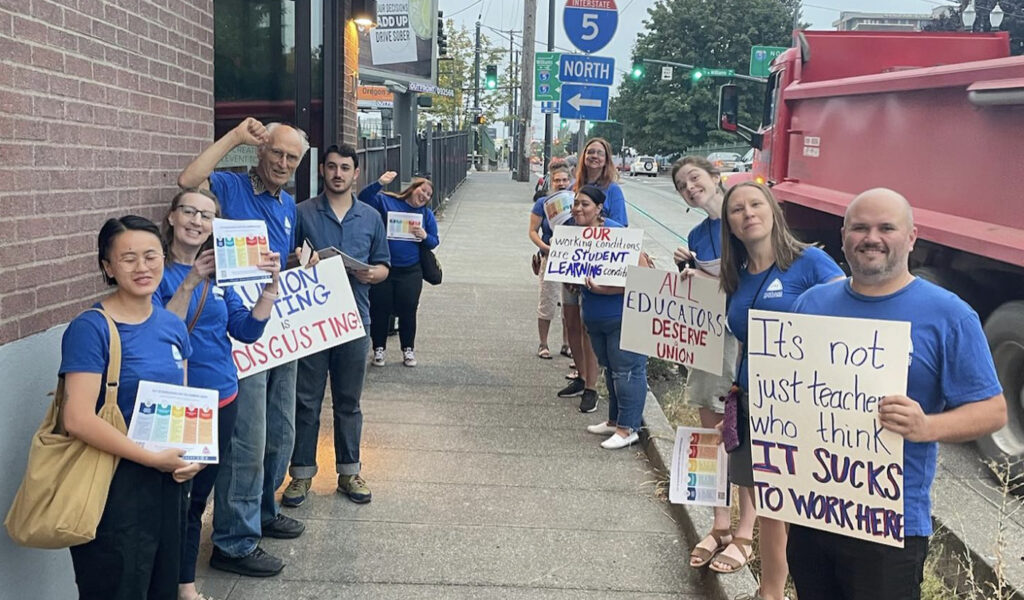Parents file $100M unfair labor practice complaint vs. Portland teachers’ union over 2023 strike
Parents have filed an unfair labor complaint against the Portland teachers’ union, claiming its strike last November was illegal and necessitates restitution for the harmed families.
The…

Parents have filed an unfair labor complaint against the Portland teachers’ union, claiming its strike last November was illegal and necessitates restitution for the harmed families.
The complaint, filed Thursday with Oregon’s Employment Relations Board, lists four anonymous Portland Public School (PPS) parents as plaintiffs and the Portland Association of Teachers (PAT) and Oregon Education Association (OEA) as defendants.
“Study after study demonstrates the harmful and long-lasting negative effects teacher strikes have on students,” Daniel Suhr, attorney for the plaintiffs, said in a press release. “The PAT’s illegal strike especially hurt already vulnerable families from low-income households and children with learning disabilities.
“These families have a right to an uninterrupted education focused on student achievement and development, not union politics.”
In 2023, PAT went on strike for almost the entire month of November, forcing nearly 50,000 students out of the classroom. Its list of demands included significant pay hikes, more racial equity and restorative justice trainings, and housing assistance for struggling families.
The complaint argues union strikes are legal in Oregon only if the union is striking over “mandatory subjects of bargaining.” Unions can bargain over a broader range of “permissive subjects,” but cannot legally strike over them.
Permissive subjects discussed in the PAT strike included:
- School curriculum
- The school calendar
- The use of teachers’ aides
- The selection of substitute teachers
- Provisions related to breastfeeding mothers
- Standards of performance evaluation for teachers
- And student discipline
“The statute is clear: a strike is ONLY legal when it is ONLY over mandatory topics of bargaining,” the complaint reads. “The strike may have ended much sooner, or even never happened, had the union limited its demands to mandatory topics.
“Instead, it continued to insist that its top priorities included permissive topics, and to tell the District, its membership, and the public that strike settlement was only possible if the District caved on these permissive topics.”
The complaint also referenced a letter released by former PAT bargaining chairman Steve Lancaster, who lambasted the union’s negotiation tactics.
Plaintiffs argued families are the main victims of extended teacher strikes, since parents are the ones “forced to skip shifts of work, unwillingly use paid time off (sick or vacation days), forgo salary (use unpaid FMLA leave), or pay out-of-pocket expenses for babysitters, tutors, or day camps. …
“The families are the intended collateral damage of the strike – the more pain they experience, the sooner the elected school board caves.”
The complaint asks that PAT and OEA be forced to compensate families who were affected by the strike, including:
- $279 for each canceled school day – of which there were 11 – to each PPS family for child care costs
- $25 per day per student for emotional distress
- $25 per day per family for emotional distress
- $94 per student for each lost school day that will not be made up
- $175 for each student whose competitive season (e.g. athletics) was affected by the strike
- $500 for each high school senior for disruption to their academic counseling, college visits, and other difficulties arranging post-graduation plans
If the case is ruled in the plaintiffs’ favor, the total compensation would likely exceed $100 million.
The plaintiffs also asked the Employment Relations Board to declare the union’s contract with PPS invalid – or at least the portions of it relating to permissive subjects that cannot be the subject of a strike.
The strike was “intentionally extortionate and coercive,” the complaint concluded. “Declaring the entire CBA [collective bargaining agreement] invalid is a strong disincentive to future bad behavior that undermines [bargaining laws] by this union or any other union, pushing them back towards the harmonious and cooperative relationship envisioned by the legislature.”



